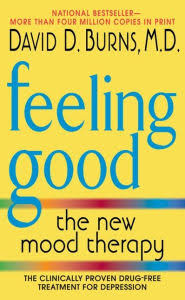Nov 25, 2019
Happy Thanksgiving if you live in the United States! This is my favorite holiday, because it means just hanging out with the people you love, eating some wonderful food together, and doing simple things like a family hike, without the commercialism and "push" of some of the other holidays. I wish the very best to you and yours, too!
Today, Rhonda could not join us due to Yom Kippur, the highest Jewish holy day. So we will record three podcasts with my wonderful neighbor, Dave Fribush, as host. In addition, we are joined by Michael Simpson, who flew out from New York to attend my Empathy workshop two days ago. He will also join the Tuesday group at Stanford tonight. Michael is doing a massive upgrade / fast lift of my website, www.feelinggood.com, which will likely be published by the time you read this. Let us know what you think about the new "look."
Dave Fribush, Michael and I answer many thought-provoking questions submitted by listeners like you!
1. How can I overcome my fear of blushing?
Hi David,
Hopefully this reaches you well. I am dealing with Erythrophobia (the fear of blushing) and have been having issues with going out with friends, being in public, in work meetings, etc. The weird part is that I don't even get red, but the visualization in my head is so vivid sometimes (Kool-Aid man) that I believe it.
Sometimes, if I think about it long enough (like an internal panic attack for 20+min), I get kind of red. . . . Currently, I am trying to just break this habit and I have been reading your book When Panic Attacks and it has been pretty good at helping me.
I have been facing my fears and going out into public and hanging out with friends; I'm kind of anxious on the inside of getting red all of sudden, which puts me on edge. I look in the mirror and see that I am not red, but it’s been hard to train my brain to believe it. I started reading your book five days ago and it has helped a lot already. Since then, I have been able to accept
I don't mind being occasionally red or nervous and I'm fairly confident, but I struggle to accept the idea of being perpetually red? Part of me wants to accept the idea that "Eff-it! If I'm red, I'm red! That's who I am,” but another part of me knows that it's not true; occasionally I might blush but it’s not the norm.
Please let me know if you have any advice. I think this might be a great podcast topic because I know a lot of people with Rosacea deal with anxiety and I'm sure that would help a lot of others.
Best, Alex
Hi Alex,
I have a awesome podcast on the fear of blushing! You might find it helpful (Podcast #88, published on May 14, 2018.)
I cannot do therapy through this medium, so this is just general teaching, but exposure / self-disclosure in one method you could use. You could tell 5 to 10 strangers every day something like this:
“Could I speak to you for a moment? I’ve had the fear of blushing almost all of my life, and I’ve been hiding it from everybody out of shame. But today, I’ve decided to stop hiding and being ashamed, so I’ve decided to tell people, and that's why I'm telling you.”
You’ll find tons of additional ideas in the podcast and in one of my books, like the one you’re reading, When Panic Attacks, as well as The Feeling Good Handbook.
Actually, blushing is NEVER a problem. The only problem is the shame. Without the shame, the blushing, like shyness, can be an asset, making you more human and more appealing.
Also, on my Sunday hike yesterday, we were joined by a young Stanford dermatologist who showed us some photos and videos of a new laser treatment for rosacea, which is similar to blushing. Apparently, the treatment is quite effective.
Thanks, David
2. How can you get over a broken heart?
Hi David,
First of all, I would like to thank you from my bottom of my heart for the wonderful jobs you are doing. I have a question regarding aftermath of divorce and searched feelinggood.com for any post but I couldn't find any. My best friend is going through divorce process and he cannot forget the good memories he had with this wife. He still loves her so much and would like to continue their relationship but she's not interested in that. They have been separated for 4 years and he tried his best to bring her back.
How can I help him move forward? Those good memories are haunting him?
Thanks,
Didi
Hi Didi,
Thanks for your terrific question, as most of us were rejected by someone we loved at some point in our lives.
You’re in luck! We just recorded a podcast on how to help a friend or loved one who’s hurting, and by the time you read this, it will have been published. It's Podcast #164 on “How to HELP, and how NOT to Help!” It was published on October 28, 2019. You can find the link on the list of all of the published podcasts on my website. I would definitely listen before trying to "help" your friend!
Resources for your friend might include the book I wrote on this topic, which is called Intimate Connections. One of the themes is that rejection could never upset a human being—only distorted thoughts about being rejected. This book can be helpful to the many people who have been divorced, or who have broken up with someone they loved, and are having trouble getting back into the dating game effectively, as well as the many people who are having trouble getting into the dating game for the first time.
Another great resource for him would be the chapter on the Love Addiction in Feeling Good: The New Mood Therapy. It describes a woman who had just been rejected by her husband, who was having an affair with his secretary, and she was telling herself that she couldn’t be happy without his love. The story had an amazing outcome, and might be very helpful for your friend.
Of course, motivation is incredibly important. Your friend might not want to be “cured,” so to speak, since his depression and thoughts about his Ex keep the relationship alive in his mind, and also give him an excuse to avoid dating and developing new relationships, which can be anxiety-provoking and effortful for just about anybody!
David
3. How would you treat someone with anorexia nervosa?
This question was submitted by our friend, Professor Mark Noble, on behalf of one of his colleagues at the University of Rochester.
I, David, explain what anorexia is, and describe my experience with an anorexia patient I treated in Philadelphia when she was discharged from the inpatient unit. I emphasize the need for the TEAM-CBT technique called the Gentle Ultimatum, since the patient didn't want o maintain her weight at a safe level, and just wanted to talk talk talk during sessions without doing any psychotherapy homework.
I also describe the “Coercive Therapy” also called Family Therapy for anorexia, developed at the Maudsley in London, and we talk about how the same principle—getting the parents to work together on the same team, with firmness, intense mutual support, and compassionate insistence—works for almost any problem children are having.
However, this requires the parents to support one another, and work together as a strong and loving team, and many parents who are in conflict will find it difficult to do this, since the urge to argue and fight can be so powerful. Then the parents sacrifice the well-being and happiness of their children in the name of ongoing war (blame, fighting, sticking up for “truth,” and so forth).
Dave F. and Michael Simpson ask why this approach of getting parents to work together, can be so incredibly powerful and helpful to children.
David


